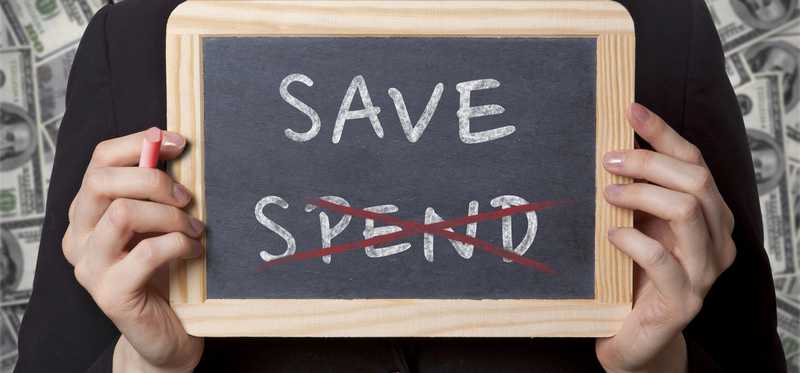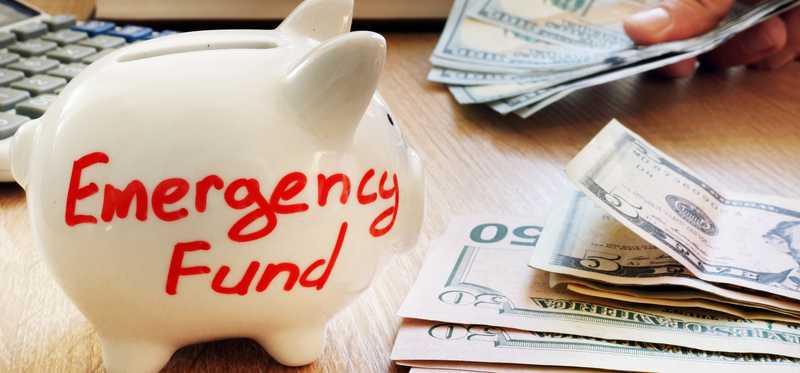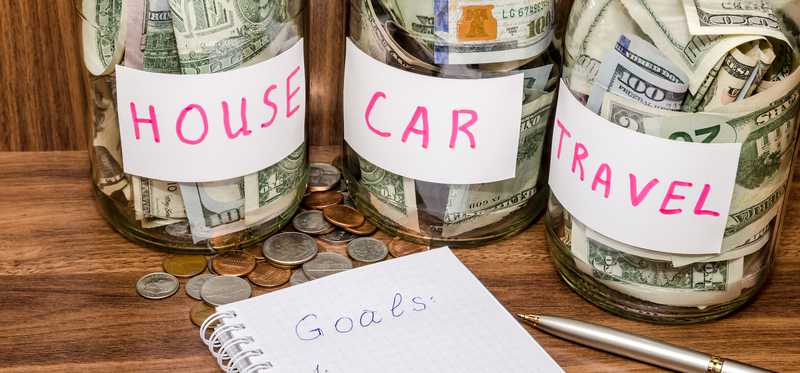15 Reasons Why You Need a Budget

15 Reasons Why You Need a Budget
Not sure where to start? You're not alone
While there are signs that inflation may finally be starting to taper down, there's no denying the strain that many consumers are feeling right now as the prices of many everyday goods and services remain at record highs. But budgeting your money wisely is key in any environment, no matter your level of income or the state of your finances.
If you don't currently have a set budget, or you feel that your current one could use a few upgrades, here are 15 reasons why you need to make a budget (and stick to it) right now.
5 Stocks Under $49
Presented by Motley Fool Stock Advisor
We hear it over and over from investors, “I wish I had bought Amazon or Netflix when they were first recommended by The Motley Fool. I’d be sitting on a gold mine!" It's true, but we think these 5 other stocks are screaming buys. And you can buy them now for less than $49 a share! Click here to learn how you can grab a copy of “5 Growth Stocks Under $49” for FREE for a limited time only.
Previous
Next

1. You should know where your money is going
It's remarkable how even seemingly small expenses can add up and impact how much money you have left at the end of each month. By setting a defined budget that includes all of your regular, as well as potential, recurring expenses, you can more accurately determine possible vulnerabilities in your personal money management strategy. If you're someone that struggles with the urge to spend, a budget can also help you put strict parameters in place to define where and how you spend your money within limits.
ALSO READ: Tired of Raiding Your Savings for Home Repairs? Try This Instead
Previous
Next

2. You can identify weaknesses in your approach to spending money
There's no denying these are tough economic times for a lot of consumers, and even the most fiscally responsible are encountering additional hurdles to saving money right now. Even so, your budget should always leave you with at least a little bit of money remaining at the end of each month. If you add up your regular and recurring expenses and compare them with your income and find you are frequently meeting or exceeding your earnings with your financial outlay, it may be time to address some deficiencies in your spending plan.
Previous
Next

3. A solid money plan can help you prepare for life's unexpected events
Feel free to divide your budget into as many or few sections as make sense to you. That being said, one indispensable part of any budget should include regular contributions to your rainy day fund.
When you make building your emergency fund part of your overall budget, you can ensure that if a calamity strikes in the future, you're not caught off guard and forced to go into debt or pull from your investment portfolio to cover an unforeseen expense.
Previous
Next

4. You can better align both your short- and long-term financial goals
While there is no singular right way to set up a budget, having one can show you where you need to make adjustments in order to meet the financial targets you've set. Your budget will be personal to your needs and goals. For example, if you're saving to buy a house, the way you structure your budget will likely look very different than how someone who's getting ready to head off to college will do it.
Previous
Next

5. You can allocate money in the way that serves you best
If you're a salaried or hourly employee, you'll have a predictable level of income within which to budget each and every month. On the other hand, if you're self-employed or do freelance work, you might find that your income varies from month to month. Whatever your personal financial situation, you should aim to never spend more than half of your monthly income (after taxes) toward your necessary expenses. These include things like your mortgage or rent payment, utilities, car payment, and food.
The way that you allocate the remaining half of your income and fit it into your budget will depend on a range of factors, including any outstanding debt you carry, how much money you plan to set aside each month, your financial goals over the near term (three to five years) and long term (five to 10 years or more), how much money you spend on discretionary items (e.g., travel, eating out), and any other financial obligations that might cut into your budget.
5 Stocks Under $49
Presented by Motley Fool Stock Advisor
We hear it over and over from investors, “I wish I had bought Amazon or Netflix when they were first recommended by The Motley Fool. I’d be sitting on a gold mine!" It's true, but we think these 5 other stocks are screaming buys. And you can buy them now for less than $49 a share! Click here to learn how you can grab a copy of “5 Growth Stocks Under $49” for FREE for a limited time only.
Previous
Next

6. You don't want to leave the health of your finances to chance
Even if your finances aren't where you want them to be right now, building a solid strategy around saving and spending is a perfect place to start. It doesn't matter how basic your budget is. Tracking your outlay and taking a hard look at what your spending looks like on a regular basis will provide greater clarity in other areas of your financial life. A budget can help you make more strategic choices about both saving and investing, forming robust habits that impact your financial health for years to come.
ALSO READ: Losing Sleep Over Your Finances? There's Someone You Should Talk To
Previous
Next

7. You can identify where you need to scale back
Even if you've always done an excellent job of managing your money, a budget is still a fantastic tool to track your saving and spending as you encounter life and income changes. And if you find yourself struggling to manage the money you make and cover your monthly expenses, forming a budget and staying on top of it is a valuable first step to help you break any bad financial habits you've formed. A budget can also help you determine exactly what areas of your spending habits are having the most impact and potentially impeding your ability to meet your financial goals.
Previous
Next

8. You can more easily separate essential from discretionary spending
Naturally, there are certain expenses you won't be able to simply scale back. On the flip side, an analysis of your spending habits may reveal some areas that are regularly cutting into your budget and where you might be able to scale back more easily than you think.
For example, you've likely heard the old adage that making your coffee at home can save you big bucks. And while it might seem a bit outlandish at first that something as simple as tending to your caffeine needs could make much of a dent in your budget, studies have shown that consumers spend as much as $2,000 or so a year on coffee alone.
No one's saying you should cut out all your "fun" purchases or entirely forgo deliveries from your favorite café or coffee shop. The moral of the story is $20 here or $10 there can really add up throughout the year, and even a few changes to the types of spending you engage in could save you hundreds or even thousands of dollars throughout the course of a year.
ALSO READ: The Average American Spends This Much on Impulse Purchases
Previous
Next

9. You can allocate a set amount of money to save each and every month
Let's face it, while saving money is crucial to one's financial health, making a habit of saving is still something that many consumers struggle to achieve. Rather than waiting until the end of each month to see what you have left over after taxes and expenses are deducted from your income, make saving a nonnegotiable slice of your monthly budget, just like rent or your car payment.
Keep things simple by automating a certain amount to be transferred into your savings account once or twice a month after you get paid. Even if it's just a few hundred dollars a month to start, those regular contributions can and will add up over time.
Previous
Next

10. You can alleviate the guesswork
While following a set budget might be new to you, there's a surprising level of financial freedom that comes with establishing a plan for managing your money and staying on top of it. Knowing where your money is going and exactly how much you're saving in a given month can also bring significant peace of mind. For example, should an unexpected cost arise, if you've been regularly contributing to your emergency fund as part of your monthly budgeting, you won't have to panic about where you'll get the money to pay for it.
5 Stocks Under $49
Presented by Motley Fool Stock Advisor
We hear it over and over from investors, “I wish I had bought Amazon or Netflix when they were first recommended by The Motley Fool. I’d be sitting on a gold mine!" It's true, but we think these 5 other stocks are screaming buys. And you can buy them now for less than $49 a share! Click here to learn how you can grab a copy of “5 Growth Stocks Under $49” for FREE for a limited time only.
Previous
Next

11. A budget can be adjusted as your financial situation and needs change
A budget isn't a one-and-done event. In fact, you'll probably need to analyze your budget from time to time to ensure it still fits with your current situation. You should revisit your budget once every six to 12 months or so to check in on your financial progress and assess where you have room for improvement or if certain aspects of your budget no longer apply.
ALSO READ: This Website Finds 'Missing' Money That's Owed to You
Previous
Next

12. A budget can help you more effectively create a debt repayment plan
Few things will weigh down your ability to achieve financial freedom more than debt will. While not all debt is equally bad, repaying outstanding debt (particularly the high-interest kind) should be a nonnegotiable part of your budget if it isn't already. When you finish paying off a student loan, long-standing credit card balance, or other debt, hitting these kinds of financial objectives will not only lend some slack to your budget but also enable you to focus on other key goals like saving for retirement and growing your investment portfolio.
Previous
Next

13. You can take a consistent approach to managing your money each month
A budget can serve a myriad of purposes. Importantly, it can help you moderate your spending and take a realistic look at the shape your finances are in right now. A budget can also help you form stable and responsible financial habits that over time will help you take your goals and make them a reality.
ALSO READ: Michelle Singletary Has 1 Tip to Help You Take Control of Your Spending
Previous
Next

14. A budget can help you to avoid living beyond your means
As consumers, we're constantly bombarded by advertisements and other compelling content urging us to spend more and more money. While there's nothing wrong with enjoying your hard-earned cash, the temptation to live beyond one's means is a constant for the modern consumer.
Rather than expanding your allocation for discretionary spending, as you hit financial goals, increase your income, or otherwise experience changes that fundamentally impact your budget, aim to stay living below your means and use any extra money you have to work with to save or invest for your future.
Previous
Next

15. A budget can help you invest more effectively
Building a diversified investment portfolio is a crucial aspect of accumulating long-term wealth and planning for a stronger, financially stable future. Rather than leaving your investing habits to chance, consider incorporating regular contributions to your portfolio as one slice of your monthly budget. You can also automate a certain amount of money to be invested into your portfolio each month so that no matter how busy you get, you can still meet your portfolio goals.
5 Stocks Under $49
Presented by Motley Fool Stock Advisor
We hear it over and over from investors, “I wish I had bought Amazon or Netflix when they were first recommended by The Motley Fool. I’d be sitting on a gold mine!" It's true, but we think these 5 other stocks are screaming buys. And you can buy them now for less than $49 a share! Click here to learn how you can grab a copy of “5 Growth Stocks Under $49” for FREE for a limited time only.
Previous
Next

Your budget doesn't need to be complicated
Whether it's through a handwritten budget, a budgeting app, or a spreadsheet, listing all of your regular expenditures and measuring them up against your income can be incredibly revealing. Your budget can be as simple or detailed as you wish, but there are a number of key areas a well-formed budget should always address.
Your budget should include constant monthly expenses like rent or your car payment, while leaving room for nonregular expenses that may pop up throughout the month. Putting money toward both saving and investing, as well as paying down existing debt, should also be part of any comprehensive budget.
Your budget will change with time. Don't hesitate to refine it as you need to. Whether your goal is to save more money, pay off debt that you've been carrying, or simply get a clearer look at where your money is going each month, consistency (or the lack of it) can make or break your personal finance plan.
The Motley Fool has a disclosure policy.
Previous
Next
Invest Smarter with The Motley Fool
Join Over Half a Million Premium Members Receiving…
- New Stock Picks Each Month
- Detailed Analysis of Companies
- Model Portfolios
- Live Streaming During Market Hours
- And Much More
READ MORE
HOW THE MOTLEY FOOL CAN HELP YOU
-
Premium Investing Guidance
Market beating stocks from our award-winning service
-
The Daily Upside Newsletter
Investment news and high-quality insights delivered straight to your inbox
-
Get Started Investing
You can do it. Successful investing in just a few steps
-
Win at Retirement
Secrets and strategies for the post-work life you want.
-
Find a Broker
Find the right brokerage account for you.
-
Listen to our Podcasts
Hear our experts take on stocks, the market, and how to invest.
Premium Investing Services
Invest better with The Motley Fool. Get stock recommendations, portfolio guidance, and more from The Motley Fool's premium services.